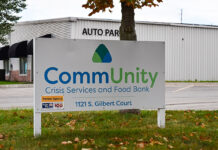The recent banking meltdown has left many Americans with more questions than answers. The stunning collapse of two American banks, Silicon Valley Bank and Signature Bank, and the loss of investor confidence in Credit Suisse has led to dramatic market swings on Wall Street and put investors on edge.
But how severe is the crisis in the larger economic picture, and should Corridor investors and business leaders be worried? To gain some perspective, we posed a series of questions to David Jacob Cooper, Department Executive Officer for the Economics Department and Tippie and Rollins Chair in Economics in the University of Iowa’s Tippie College of Business, for his expert perspective. Here are our questions and his responses.
CBJ: Is my money safe, both from a business and personal perspective?
Mr. Cooper: Yes, your money is safe. The most likely place that you have your money deposited is a bank that is insured by the federal government through the FDIC. (It is possible that you are insured through a different entity; credit unions, for example, are insured through the NCUSIF.) You are insured up to a maximum of a quarter million dollars. In practice, even uninsured funds in a bank are quite safe. As happened with Silicon Valley Bank (SVB), the government steps in to protect depositors in banks.
CBJ: Will the emergency measures put into place by the federal government prevent more bank runs like the ones we’ve seen recently?
Mr. Cooper: Most likely they will succeed. Bank runs are largely a matter of expectations. No bank holds enough money on hand to pay all of its depositors. As long as not everyone tries to get their money at once, this works just fine. It is unlikely that everyone needs to withdraw their funds simultaneously, and as long as depositors expect the bank to be sound, there is no reason to not leave their money in the bank.. But in a bank run, depositors do not believe the bank is sound. Fearing the worst, they try to withdraw their money as fast as possible. This becomes a self-fulfilling prophecy. Because people believe the bank is not sound, panic, and try to withdraw all of their money, the bank in fact becomes unsound.
A large part of what the government aims at is convincing people that they do not need to panic. When they see the government cover uninsured deposits, for example, they become less concerned that a bank failure will destroy their savings. It is like a form of magic. If you can convince people that banks are safe, they will be safe.
CBJ: Why were Silicon Valley Bank and Signature Bank particularly vulnerable to collapse?
Mr. Cooper: SVB was particularly vulnerable because its heavy investments in U.S. government bonds and its high-level involvement in the tech sector made it especially sensitive to rising interest rates. SVB was also vulnerable because it had a high percentage of uninsured deposits. This made it particularly likely to have a bank run, as nervous depositors pulled out their money. Holding a high percentage of uninsured deposits was also an issue for Signature.
CBJ: How does this crisis compare to the global financial meltdown of 2008?
Mr. Cooper: This bank crisis is not as severe and the underlying causes are different. While the U.S. economy certainly faces challenges, I would be surprised if we see a repeat of the Great Recession.
CBJ: Are other banks, including community banks in the Corridor, at risk of experiencing similar issues?
Mr. Cooper: It is unlikely. They are all backed by federal insurance and are unlikely to have the unusual portfolio of deposits that made SVB or Signature vulnerable.
CBJ: Did the advent of digitalization in the banking industry accelerate the crisis with affected institutions?
Mr. Cooper: Yes. It has become very easy to move money electronically. In a bank run, you no longer need to take the time to literally run to the bank. You can just hop onto your online account and make a transfer. The entire process is accelerated.
CBJ: How will the situation impact mortgage rates and the federal reserve’s decisions on possible interest rate hikes?
Mr. Cooper: To be honest, based on (recent) news, less than I thought might happen. I thought the Fed might go with no rate hike to help stabilize banks. Whatever the concerns about bank stability may be, inflation remains a major ongoing problem for the economy.




